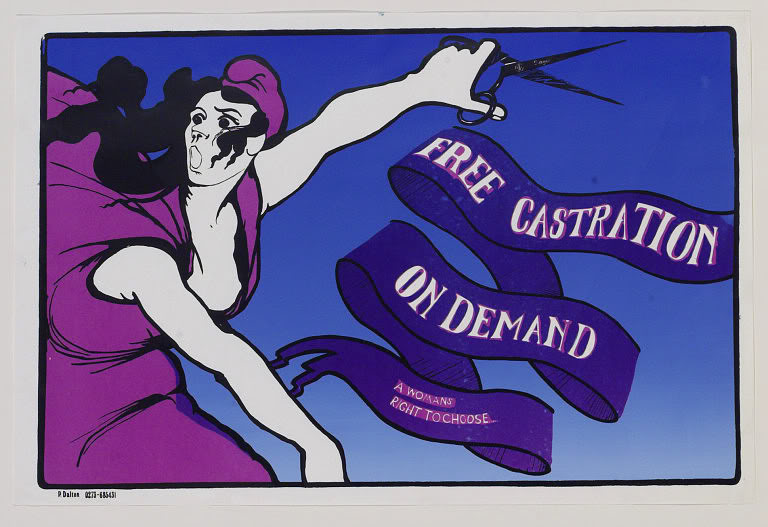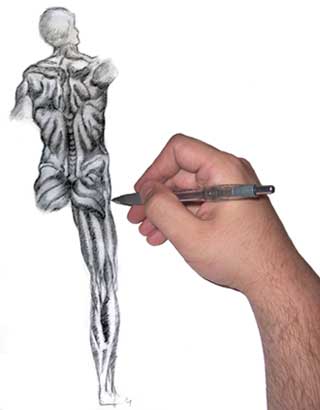Lecture No. 5
“The weakness of men is the façade of strength: the strength of women is the façade of weakness” – Warren Farrell
Among the worst mistakes that freedom-loving people can make is to stereotype feminists as a small, motley crew of angry lesbians who have long since ceased to be relevant. Take note: this stereotype helps them.
I must repeat myself: this stereotype helps them.
Let that sink in for a moment. Every time you have belittled feminists as a bunch of cranky old hags that nobody takes seriously, you have helped to obscure their program and indeed, their very existence as a form of organized power. Belittle them, you must – but do so in a way which exposes, not obscures! For feminism is far from being a relic of the past. The feminist movement is taken very seriously indeed by those with the power to enforce its core aims:
(2) The punishment of men.
(3) To increase (1) and (2) in terms of scope and intensity indefinitely.
Obscurity assists the realization of these goals by creating doubt amongst potential opponents. The misidentification of feminism as a cultural artifact which no longer holds sway over the operations of government and society is a product of feminism’s own metamorphosis. Note that the essence, or substance of feminism has not changed over the years, only its form, or packaging. The change of packaging has proved so effective that some now deny that the product still exists.
Au contraire. As much as the times changed with feminism, feminism has changed with the times. In the transformation of feminism from a movement opposed to government and society at large, into a movement which controls the state and public opinion – and uses this position to persecute the new enemies of the state – its strategies underwent a certain cultivation. Today, feminists no longer need to throw temper tantrums to get their way, because while they once raged against the machine, they now control it. This is the truly profound shift in Western societies since the height of consciousness about feminism in the middle of last century; it is not that feminists have become less relevant, but more.
As Fidelbogen recently put it:
Feminism is now lodged in the institutional structures, hence, “respectable”. I might compare it to organized crime, which was openly thuggish in the early racketeering days, but once they got their people into “city hall”, and into electoral politics, learned to wear a silk tie and play the game in a different way.
When feminists were outside the tent, causing offense was one of their prime weapons – poorly disguised as edgy boundary-pushing. Who remembers this lovely piece of propagandistic hate, published in the 1970s?
The above is precisely the kind of thing that feminists today like to pretend never happened. Now that feminists are inside the tent, they are forced to defend their gains; in the 1970s, when the above picture was produced, they attacked from the outside, and sought to tear down official morality rather than (as they do now) define and dictate it.
And how better to maintain control than by punishing those who attack, or who might attack, the new status quo? We are of course referring to men, who stand to lose the most from the three core aims of the feminist project as listed above. Today, feminists believe that women have the inalienable right to not feel offended, and they do not hesitate to employ state violence to enforce this. Prosecuting those (men) who cause offense is their new weapon, one which has replaced the old (causing offense). Of course, persecuting people merely for being offensive is rather less charitable than men were to feminists before feminists took over. But, as Gynocentrism Theory tells us, men were only charitable to offensive women in the early days of feminism because women already exercised substantial control.
Do feminists believe that they are doing right? The answer is an unequivocal yes for most of them – they truly do believe that they are a righteous people, and even when they become cognizant of doing wrong, they rationalize that they are also, simultaneously, doing right. How could this be? Well, let me show you how it works, by tracing the anatomy of a victim ideology.
Once a period of consciousness-raising has propagated the belief that the members of a group are – by their essential nature as members of the group – victims, the group shall pursue two objectives:
(2) To forge their own ‘victim identity,’ separate from and unaccountable to the ‘enemy’ group.
You will notice that, while the first objective brings the ‘victim’ group closer to the ‘enemy’ group, in terms of status, expectations, autonomy, etc., the second widens the gulf between them. The first objective, we are told, will unite us in our common humanity, and bring about liberty for all, and other nice things like that. But as soon as we get close to this, there tends to be a drift towards proclamations of the importance of the second objective. Nothing will ever be enough to satisfy the ‘victim’ group, because they view themselves as essentially and inherently the victims of the ‘enemy’ group, regardless of what may have changed in reality. A victim ideology is anti-contextual, and its followers – the self-designated ‘victims’ – shall never see themselves as anything but. Their victimhood is affirmed in advance, and the facts must be made to fit the story. In other words, they will spin any situation into one where they are most harshly treated.
This is why feminists like Hillary Clinton can get away with saying things like
women have always been the primary victims of war. Women lose their husbands, their fathers, their sons in combat.
Well, sure – losing family members to horrible deaths is so much worse than actually having to die those horrible deaths. That is, if your whole worldview is tainted by sexism and you reduce the status of men to Protecting/Providing Objects. In Mrs Clinton’s quote, no humanity is ascribed to men whatsoever. The real problem is not that they are traumatized, mutilated and blown to pieces per se; it is that, because of their being subject to atrocities, men will not be able to fulfill their protecting/providing roles quite so effectively. It is, therefore, women who lose out, because men don’t actually matter except insofar as they can assist females. This is precisely the kind of attitude which emerges out of a victim ideology. The entirety of existence, in all its wonderful complexity, is reduced to black-and-white primitivism: my people matter, your people don’t. Or, as we shall see, my people good, your people bad. Anything good for my people is good, no mind whether it is good or bad for your people.
This kind of thinking is known as Manichean Essentialism, and it is the metaphysical cornerstone for feminism as a whole. Decades of consciousness-raising have ensured that women are reflexively considered to have been wronged, whatever the facts. Whenever genuine examples of women being wronged cannot be found, compensatory privilege becomes the sanctioned goal. That is, women are treated more leniently in one regard because they are believed to be disadvantaged in unrelated regards, or just disadvantaged in general. One recent example of this from the United Kingdom is the order issued by Dame Laura Cox to judges that they must treat female criminals with greater leniency, a ruling which simultaneously reduced British men to second class status while green-lighting abusive women who might otherwise have been deterred.
There are some who go further than this. Baroness Corston, who explicitly identifies as a feminist, believes that women don’t really deserve to be punished at all when they commit crimes. Her 2007 Government report advocates that all women’s prisons should close, and that even the most violent and abusive female offenders should not be locked up. Indeed, they
would no longer go to one of the country’s 15 women’s prisons, which would all close. Instead, killers such as Rose West, serving life for the murder of ten young women and girls, would be sent to “homely” local custody units. There they would be allowed to live as a “family unit” with between 20 and 30 other women prisoners, organising their own shopping, budgets and cooking. The units would also allow them to stay close to their families … All the women’s jails would shut within the next decade, and could instead be converted into prisons for men … The report claims: “Women and men are different. Equal treatment of men and women does not result in equal outcomes.”
The above is a classic example of Orwellian Newspeak. Anti-feminists of all stripes have been saying for decades that men and women are essentially different. Feminists have insisted that men and women are essentially the same, and we must therefore have equal treatment. But as soon as equality works retrograde to the goal of female empowerment, it is dropped like a hot potato, and feminists twist themselves around in incredible semantic gymnastics to justify the sudden turnabout.
Women also (sic) never be sent to jail to “teach them a lesson”.
Of course they shouldn’t. Women shouldn’t have to actually learn how to abide by the law, much less how to be functioning members of civilization. They should be allowed to run wild and free, abusing and destroying anything they please with absolute license. They shouldn’t even expect a slap on the wrist for their misbehavior – that would be domestic violence, don’t you know?
But if feminism truly was about equality, shouldn’t feminists be pushing for new laws to criminalize more women, rather than their anti-egalitarian approach of imprisoning less women and more men? Or does equality only matter when it is women who are deemed unequal? (In and of itself, this would imply strongly that women are a privileged class like no other.)
The female incarceration rate is just one-eighth that of men in the United States (Wikipedia, accessed 10th October 2010), while women account for only 5.7% of inmates in Great Britain (accessed 10th October 2010). Surely, if equality was the goal, we would be relaxing the punitive, feminist-inspired laws against men, and seeking to punish more women instead. I can think of nowhere in modern society that is more male-dominated or unrepresentative than the penal system – something which, in the interests of sexual equality, needs to change.
But no – flatly contrary to the principles of neutral, impartial justice, feminists deem it a good thing for its own sake to lock up fewer women! It is as though women who are guilty of crimes aren’t really guilty – and are therefore victims of whatever is done to them as punishment. It is a popular notion that women are disadvantaged – generally, inherently, essentially, within the very fiber of their being – and so must be disadvantaged in every particular area of life; thus, anything done to assist them must be a reduction of unfair disadvantage. Any rationally-minded person can see how absurd this all is, and I include leading feminists in this, as they are shrewd but not stupid. Just deserts, deterrence, fair treatment, civilization itself be damned; this is Gynocentrism in action.
To recap, victim ideologies such as feminism seek to:
(2) Forge their own ‘victim identity,’ separate from and unaccountable to the ‘enemy’ group.
That these two objectives are in contradiction is not just a logical flaw; it’s part of a strategy which allows the ‘victim’ group to shift its stance as circumstances require. Objective (1) might be consistently pursued for a little while. But if the movement comes under scrutiny for disadvantaging the ‘enemy’ group, the ‘victims’ can just switch to objective (2) and emphasize the importance of their own uniqueness in ways for which equality does not suffice. Or, as feminist Germaine Greer puts it:
In 1970 the movement was called ‘Women’s Liberation’ or, contemptously (sic), ‘Women’s Lib’. When the name ‘Libbers’ was dropped for ‘Feminists’ we were all relieved. What none of us noticed was that the ideal of liberation was fading out with the word. We were settling for equality. Liberation struggles are not about assimilation but about asserting difference, endowing that difference with dignity and prestige, and insisting on it as a condition of self-definition and self-determination. … the visionary feminists of the late sixties and early seventies knew that women could never find freedom by agreeing to live the lives of unfree men.
Once equal status has been reached, the rhetoric of equality can be discarded, because who wants to be only equal to a man anyway? Here, in black and white, is a statement of female supremacy.
Same as it ever was.
If equality had ever been the end goal, then men’s disadvantages would have been addressed seriously, and not exacerbated while men themselves were goaded. To this day, the only time a feminist bothers herself with an issue of male disadvantage is when it benefits women to point it out – as in the case of parental leave. Enforced equal paternity and maternity leave rules out any disincentive that employers have to hire women. A feminist will set aside her ‘all fathers are rapists and abusers’ shtick, just long enough to insist that men should have equal rights to parenting – but this is typically presented as a demand that men shoulder the burdens of raising children so that women may be empowered in the workplace. Even when injustices against them are being redressed, men are tools for female betterment.
Same as it ever was.
Another example is male rape in prisons. This is occasionally highlighted by feminists, but only because men can be shown to be the oppressors, allowing them to attack maleness itself. Feminists pick up the torch once the rapist has done his part; they complete the rape victim’s sexual humiliation by destroying his self-identity, poisoning his mind with aspersions that maleness itself is to blame for his victimization; and so a fundamental, immutable part of himself was the cause of his rape. They force upon him the identity of rapist along with rape victim, their vilification of ‘toxic masculinity’ serving to assure him that he shares the abusive characteristics of his abuser. On the other hand, the high level of female culpability in child abuse, both sexual and non-sexual, is ignored or denied.
This is why our universally applicable definition of feminism could not have included any reference to ‘equality’ – it’s not a reasonable statement to make if we’re using analytical tools more incisive than Manichean Essentialism. The universal definition remains, and no ground can possibly be ceded: feminism is the project for increasing the power of women.
Power in what regard? Power to do what? Such questions inevitably arise. The answer, if you’ve been following closely, is obvious – whatever they please, no matter who else is harmed. Silence is not consent, but it is complicity, when you have the power to draw attention towards abuse and the resources towards stopping it, yet you fail to do so on the grounds that the abusers have genitals that resemble your own.
And that’s what it comes down to, folks – we are dealing with primitives in pantsuits.
Adam
Further Reading:
Welmer. Feminism and the Prison Industrial Complex
Babette Francis. Feminist Legal Theory
Oz Conservative. Men’s role is to empower women for what exactly?
GYNOCENTRISM THEORY LECTURE SERIES:
1. Staring Out From the Abyss
2. The Same Old Gynocentric Story
3. Refuting the Appeal to Dictionary
4. Pig Latin
5. Anatomy of a Victim Ideology
6. Old Wine, New Bottles
7. The Personal, as Contrasted to the Political
8. Chasing Rainbows
9. False Consciousness & Kafka-Trapping
10. The Eventual Outcome of Feminism, Part I
11. The Eventual Outcome of Feminism, Part II
12. How to Break a Dialectic



You must log in to post a comment.